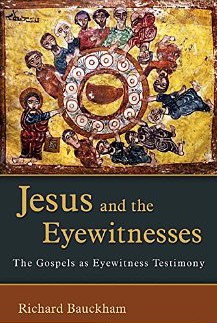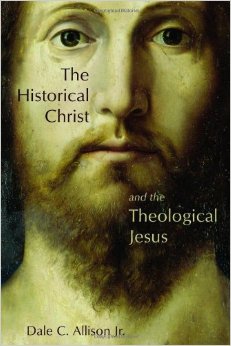| Scot McKnight is an American New Testament scholar, historian of early Christianity, theologian, speaker, author and blogger who has written widely on the historical Jesus, early Christianity, the emerging church and missional church movements, spiritual formation and Christian living. He is currently Professor of New Testament at Northern Baptist Theological Seminary in Lombard, IL. McKnight is an ordained Anglican with anabaptist leanings, and has also written frequently on issues in modern anabaptism. — Wikipedia (4th Oct 2015) |
 I cited Scot McKnight in my first serious attempt to point out the differences in the ways biblical scholars approach their study of Jesus and Christian origins from the ways other historians handled sources and investigated other historical persons and events. In Jesus and His Death McKnight quite rightly notes the general ignorance among his theologian/biblical studies peers of the methods followed by other historians and their debates over the very nature of their craft. He notes that the reliance upon criteria of authenticity (“criteriology”) is both unique to historical Jesus studies and fallacious. In another early post I quoted McKnight’s view that historical Jesus scholars are in fact fooling themselves when they claim their reconstructions of Jesus are derived solely from the evidence:
I cited Scot McKnight in my first serious attempt to point out the differences in the ways biblical scholars approach their study of Jesus and Christian origins from the ways other historians handled sources and investigated other historical persons and events. In Jesus and His Death McKnight quite rightly notes the general ignorance among his theologian/biblical studies peers of the methods followed by other historians and their debates over the very nature of their craft. He notes that the reliance upon criteria of authenticity (“criteriology”) is both unique to historical Jesus studies and fallacious. In another early post I quoted McKnight’s view that historical Jesus scholars are in fact fooling themselves when they claim their reconstructions of Jesus are derived solely from the evidence:
While each may make the claim that they are simply after the facts and simply trying to figure out what Jesus was really like—and while most don’t quite say this, most do think this is what they are doing— nearly every one of them presents what they would like the church, or others with faith, to think about Jesus. Clear examples of this can be found in the studies of Marcus Borg, N.T. Wright, E.P. Sanders, and B.D. Chilton—in fact, we would not be far short of the mark if we claimed that this pertains to each scholar—always and forever. And each claims that his or her presentation of Jesus is rooted in the evidence, and only in the evidence. (Jesus and His Death, p. 36)
McKnight has elaborated on some of his views about historical Jesus scholarship and the nature of biblical source material in a new publication, I (Still) Believe: Leading Bible Scholars Share Their Stories of Faith and Scholarship.
The Bible is God’s true and living word
McKnight does not hide his view that his historical studies are investigations into “God’s true and living word”. Don’t call him an inerrantist, though. Rather, each book in the Bible adds to the previous one, “sometimes agreeing, sometimes even disagreeing, but often expanding and adjusting and renewing — the previous texts. God’s inspiration then is at work in a history and a community as expressed by an author for a given moment.”
It was not until many years later that I read Michael Fishbane’s Biblical Interpretation in Ancient Israel when he gave me the best words for what is happening in the Bible and not least in the Synoptics. There is an inner dialogue at work and once one begins to see the dialogue one sees the Bible for what it really is. It is not one self-contained text added to the previous but one text interacting with — sometimes agreeing, sometimes even disagreeing, but often expanding and adjusting and renewing — the previous texts. God’s inspiration then is at work in a history and a community as expressed by an author for a given moment. This experience of underlining the Synoptics one word and one line after another led me to think that words like “inerrancy” are inadequate descriptions of what is going in the Bible. I have for a long time preferred the word “true” or “truth.” The Bible is God’s true and living Word is far more in line with the realities of the Bible itself than the political terms that have arisen among evangelicals in the twentieth century.
(2015-09-01). I (Still) Believe: Leading Bible Scholars Share Their Stories of Faith and Scholarship (pp. 167-168). Zondervan. Kindle Edition.
So when Scot McKnight was criticizing the scholarly methods used by his peers to investigate Jesus he was not calling for them to turn their backs on fallacious “criteriology” and turn towards the methods of other professional historians (such a turn would have meant a revision in even the very questions they asked as historians) but he was, rather, declaring that historical inquiry was not capable of uncovering very much of relevance for the Church.
As a Gospels specialist I entered into the historical Jesus debates, first with an invitation from Craig Evans and Bruce Chilton to sketch the teachings of Jesus in the context of his mission to Israel (A New Vision for Israel) but then even more intensively in a book called Jesus and His Death (Baylor University Press). Two things happened to me — at the deepest level of my being — through that decade of study. First, I became convinced the historical method used in historical Jesus studies yields limited conclusions. My “aha” moment was sitting at my desk realizing I can prove that Jesus died but I can never prove that he died for my sins; I can prove that Jesus asserted that he would be raised from the dead but I can never prove he rose for my justification. . . .
Interesting that the two details that McKnight singles out as subject to unequivocal “proof” are the two points central to the Christian faith itself. He follows by affirming the importance of traditional Church belief over the findings of historical studies. . . Continue reading “We are not historians; we are Christians — (“I know what you mean, but don’t say it like that!”)”
Like this:
Like Loading...
 The following are my notes from the the video of my previous post. I have pulled out just the section discussing Sam Harris and will post the remainder later (after listening to Kyle Kulinski’s earlier video “cease-fire“.)
The following are my notes from the the video of my previous post. I have pulled out just the section discussing Sam Harris and will post the remainder later (after listening to Kyle Kulinski’s earlier video “cease-fire“.)


